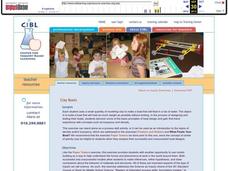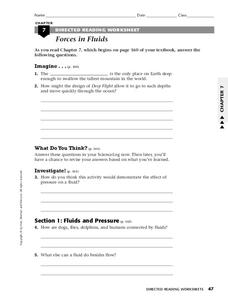Teach Engineering
Rock and Boat
Present the class with a question on whether the water level of a pond will rise they take a large rock out of a boat and drop it into the pond. Groups come down on all sides of the question and try to justify their answers. The activity...
Teach Engineering
Archimedes' Principle, Pascal's Law and Bernoulli's Principle
What do Pascal's law, Archimedes' Principle, and Bernoulli's Principle have to do with fluid mechanics? The included PowerPoint presentation provides the basic definitions and equations associated with the three. A set of homework...
National Science Teachers Association
Using Concept Maps in the Science Classroom
A good concept map requires high thought processes. This makes it a great tool for teaching and evaluating your pupils. A helpful article describes a great approach for teaching young scholars the art of concept map building and how best...
CPO Science
Physics Skill and Practice Worksheets
Stop wasting energy searching for physics resources, this comprehensive collection of worksheets has you covered. Starting with introductions to the scientific method, dimensional analysis, and graphing data, these skills practice...
Curated OER
Hitler's Lost Sub
Students watch a video clip about German submarines lost during World War II. They work together to create their own submarine out of a plastic bottle. They test the buoyancy of the submarine in different activities.
Curated OER
Properties of Matter
Students describe four states of matter and their characteristics, explain thermal expansion of matter, interpret state changes in terms of kinetic theory of matter, explain relationship between temperature and volume of a gas, state...
Curated OER
Volumw Measurement, English System
Eighth graders biew each volume container and discuss where they have seen them in their home, and how they have seen them used. They explore the different names of volume sizes and their equivalents towards one another. Students...
Teach Engineering
Above-Ground Storage Tanks in the Houston Ship Channel
Introduce your class to storage tank failures caused by major storms with an activity that looks at how the concepts of Archimedes' Principle and Pascal's Law affect the storage tanks along the Houston Ship Channel. The background...
Teach Engineering
Above-Ground Storage Tank Design Project
The challenge: determine whether a tank will float. A design activity has groups work as engineering teams in order to determine the stability of given tanks and liquid contents. The teams need to determine the equations to calculate the...
Curated OER
Float Your Boat
Students investigate buoyancy, displacement and density. In this flotation lesson students study the Archimedes' Principle, analyze data and draw conclusions.
Curated OER
Clay Boats
Seventh graders are given the opportunity to use model-building as a way to help comprehend the forces and phenomena at work in the world around them. They use both successful and unsuccessful models to make inferences, refine...
Curated OER
Forces in Fluids
In this forces in fluids worksheet, students answer questions as they relate to forces in fluids. Students complete a chart about atmospheric pressure.
Curated OER
Helium Balloon Race
Students determine the force of a helium balloon that allows it to rise a specific distance. In this helium lesson plan students calculate the amount of paper needed to construct a weight and determine the density of a piece of paper.
Curated OER
Sink or Swim
Students define density and explain how to determine the density of an object. Students participate in a demonstration that shows the differences in the densities of different liquids and how they affect the liquid's physical properties.
Curated OER
Sink or Float?
Students make and test predictions about sinking and floating, and classify objects according to whether they sink or float.
Curated OER
Sink or Float?
Students will determine whether various objects sink or float in water. They do not need to explain why objects sink or float. They are rather to be encouraged to observe that the same objects will sink or float every time, i.e., that...
Curated OER
Water and Ice
Young scholars investigate the states of matter. In this physics lesson, students use water and ice to demonstrate the characteristics of a solid and liquid. Young scholars record their observations as the state of the water changes.
Curated OER
Week 8 - Sea Life
Using a magnifier, mini marine biologists examine the barbules of a bird feather. They swirl the it into a mixture of oil and water and then re-examine the feather. After the activity, discuss how the oily feathers pose a problem to sea...
Curated OER
It's a Gas - Natural Gas
Students use plastic bottles, water, and condiment packets to simulate how natural gas comes from decaying ocean plants and animals. In this natural gas lesson plan, students also fill out lab packets and answer exit questions.
Curated OER
Buoyant Force
Students investigate the scientific concept of why some objects float when put in a liquid solution. They apply the laws of motion and force while conducting classroom activities. Students also take notes and answer target questions to...
Curated OER
Why is the Ocean Salty?
In this ocean salt instructional activity, learners read about the processes that have lead to the salt content in the ocean. Then students complete 5 short answer questions.
Other popular searches
- Density and Buoyancy Test
- Volume, Density and Buoyancy
- Heat, Density and Buoyancy
- Volume Density and Buoyancy
- Heat Density and Buoyancy
- Buoyancy and Density
- Density Buoyancy Terms
- Density Buoyancy Viscosity
- Buoyancy Density






















